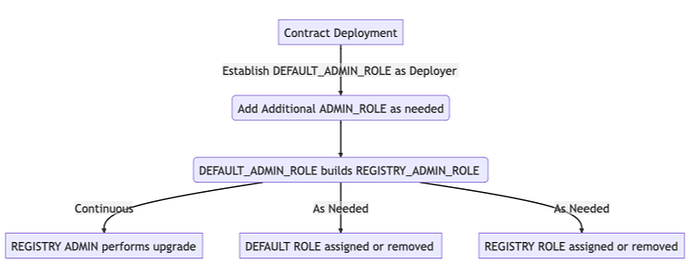IMPORTANT: This post contains ideas intended to spark discussion and gather feedback. These are not final concepts and must not be interpreted as implementation details. For official information about how XMTP works, see the XMTP technical documentation. Have questions about this post? We’d love to hear from you—post a reply.
Governance in Contract Deployment
Comparison of Approaches
Introduction
This discussion compares OpenZeppelin AccessControl and the Safe application for managing upgradeable contracts. The significance of a robust and resilient governance mechanism will help ensure the integrity and security of our protocol over time.
Current Practices and Future Directions
In all areas, we wish to balance between the need for security and agility of development. OpenZeppelin AccessControl offers a streamlined approach, facilitating continuous integration and deployment processes. It also offers the potential for improvement, including multi-party requirements.
Simplifying Complex Governance Mechanisms
The Role of OpenZeppelin AccessControl
- Ownership and Permissions: At deployment,
DEFAULT_ADMIN_ROLEis assigned to project owners, enabling them to manage other roles and permissions within the contract. - Dynamic Role Management: This system supports adding or removing members from the
REGISTRY_ADMIN_ROLE, effectively acting as contract admins with the authority to upgrade contracts. - Removing Access: At a future date, it is possible through AccessControl to remove access to all parties. For a stable contract this may be the most desirable path as there would be no need for governance at that time.
Advantages of a Streamlined Approach
The streamlined process offered by OpenZeppelin AccessControl is particularly advantageous for small teams or automated setups, allowing for efficient and flexible project management. Real-world examples, such as the deployment of xps-contract, demonstrate the effectiveness of this approach in maintaining high security and agility.
The Safe Alternative: A Comparative Perspective
Safe presents a contrasting governance model that emphasizes multi-signature approvals for on-chain actions, introducing an additional layer of security at the cost of manual operation. This model is particularly suited for projects requiring rigorous oversight and collaboration among multiple stakeholders. While Safe adds steps to the deployment process, it significantly reduces the risk of unilateral actions compromising the contract’s integrity.
Detailed Approaches to Governance
- Single Participant Approval via OpenZeppelin: Ideal for very small teams, focusing on simplicity and automation. Future role management allows for adaptability.
- Double Participant Approval via OpenZeppelin: Introduces an
enqueueApprovaloperation with the possibility of adding a time lock. This might add a layer of consensus without sacrificing efficiency. - Safe Deployment with Multi-Signature Approval: Offers the highest security level by requiring multiple approvers, suited for projects with a larger stakeholder base.
Recommendations for Effective Governance
Given the current landscape with relatively few participants in the deployment process, the first approach using OpenZeppelin AccessControl is recommended. This method provides a balance between operational efficiency and security. As the project scales, incorporating a peer approval mechanism will enhance governance, ensuring broader consensus for contract upgrades.
Broad Considerations for Future Governance
Adopting a governance model extends beyond immediate security concerns, touching on regulatory compliance, community trust, and project adoption. Future governance models must remain flexible to adapt to regulatory changes and shifts in the blockchain ecosystem, ensuring that projects can thrive in a dynamic environment.
It would make sense to upgrade to a two step approval process in a future contract deployment.
Conclusion
Deployment governance for our protocol requires a careful balance between security and efficiency. By understanding and applying the appropriate governance mechanisms, our project can secure the longevity and integrity of the fully decentralized protocol.
